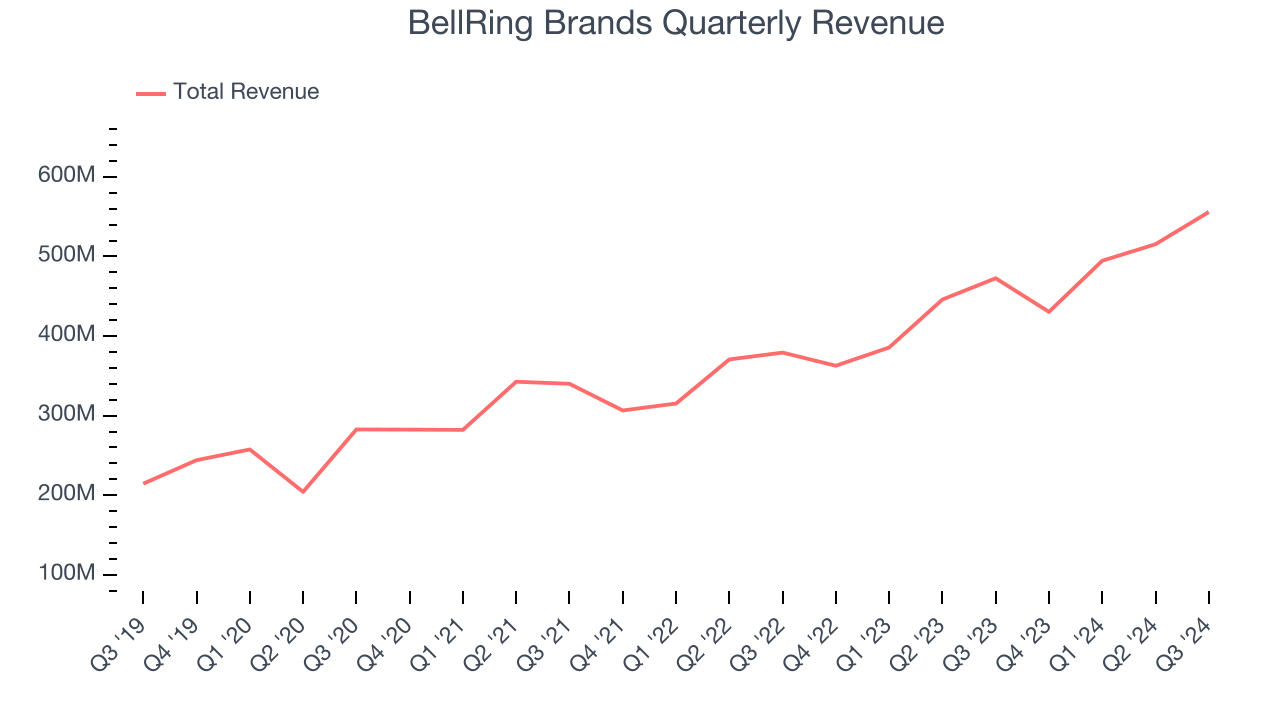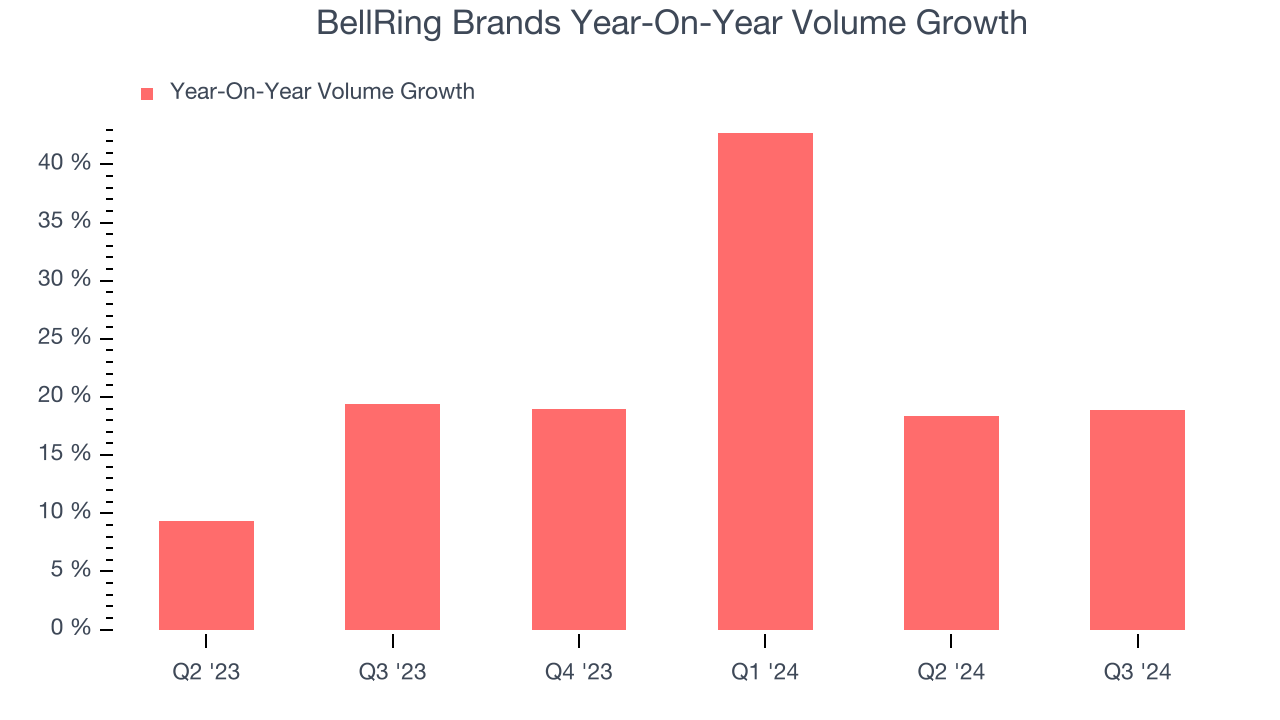
Nutrition products company Bellring Brands (NYSE: BRBR) reported Q3 CY2024 results topping the market’s revenue expectations, with sales up 17.6% year on year to $555.8 million. The company’s full-year revenue guidance of $2.28 billion at the midpoint came in 2.6% above analysts’ estimates. Its non-GAAP profit of $0.51 per share was in line with analysts’ consensus estimates.
Is now the time to buy BellRing Brands? Find out by accessing our full research report, it’s free.
BellRing Brands (BRBR) Q3 CY2024 Highlights:
- Revenue: $555.8 million vs analyst estimates of $545 million (17.6% year-on-year growth, 2% beat)
- Adjusted EPS: $0.51 vs analyst estimates of $0.51 (in line)
- Adjusted EBITDA: $116.5 million vs analyst estimates of $112.9 million (3.2% beat)
- Management’s revenue guidance for the upcoming financial year 2025 is $2.28 billion at the midpoint, beating analyst estimates by 2.6% and implying 14.2% growth (vs 20% in FY2024)
- EBITDA guidance for the upcoming financial year 2025 is $475 million at the midpoint, above analyst estimates of $467.3 million
- Gross Margin (GAAP): 36.9%, up from 32.9% in the same quarter last year
- Operating Margin: 20.2%, up from 18% in the same quarter last year
- Adjusted EBITDA Margin: 21%, in line with the same quarter last year
- Organic Revenue rose 17.6% year on year (24.6% in the same quarter last year)
- Sales Volumes rose 18.9% year on year, in line with the same quarter last year
- Market Capitalization: $9.32 billion
Company Overview
Spun out of Post Holdings in 2019, Bellring Brands (NYSE: BRBR) offers protein shakes, nutrition bars, and other products under the PowerBar, Premier Protein, and Dymatize brands.
Shelf-Stable Food
As America industrialized and moved away from an agricultural economy, people faced more demands on their time. Packaged foods emerged as a solution offering convenience to the evolving American family, whether it be canned goods or snacks. Today, Americans seek brands that are high in quality, reliable, and reasonably priced. Furthermore, there's a growing emphasis on health-conscious and sustainable food options. Packaged food stocks are considered resilient investments. People always need to eat, so these companies can enjoy consistent demand as long as they stay on top of changing consumer preferences. The industry spans from multinational corporations to smaller specialized firms and is subject to food safety and labeling regulations.
Sales Growth
A company’s long-term performance is an indicator of its overall quality. While any business can experience short-term success, top-performing ones enjoy sustained growth for multiple years.
BellRing Brands is a small consumer staples company, which sometimes brings disadvantages compared to larger competitors benefitting from economies of scale. On the other hand, it can grow faster because it’s working from a smaller revenue base and has a longer runway of untapped store chains to sell into.
As you can see below, BellRing Brands grew its sales at an impressive 17% compounded annual growth rate over the last three years as consumers bought more of its products.

This quarter, BellRing Brands reported year-on-year revenue growth of 17.6%, and its $555.8 million of revenue exceeded Wall Street’s estimates by 2%.
Looking ahead, sell-side analysts expect revenue to grow 11.4% over the next 12 months, a deceleration versus the last three years. Still, this projection is noteworthy and indicates the market is baking in success for its products.
Today’s young investors won’t have read the timeless lessons in Gorilla Game: Picking Winners In High Technology because it was written more than 20 years ago when Microsoft and Apple were first establishing their supremacy. But if we apply the same principles, then enterprise software stocks leveraging their own generative AI capabilities may well be the Gorillas of the future. So, in that spirit, we are excited to present our Special Free Report on a profitable, fast-growing enterprise software stock that is already riding the automation wave and looking to catch the generative AI next.
Volume Growth
Revenue growth can be broken down into changes in price and volume (the number of units sold). While both are important, volume is the lifeblood of a successful staples business as there’s a ceiling to what consumers will pay for everyday goods; they can always trade down to non-branded products if the branded versions are too expensive.
To analyze whether BellRing Brands generated its growth from changes in price or volume, we can compare its volume growth to its organic revenue growth, which excludes non-fundamental impacts on company financials like mergers and currency fluctuations.
Over the last two years, BellRing Brands’s average quarterly volume growth of 21.3% has outpaced the competition by a long shot. In the context of its 20.9% average organic revenue growth, we can see that most of the company’s gains have come from more customers purchasing its products.

In BellRing Brands’s Q3 2024, sales volumes jumped 18.9% year on year. This result shows the business is staying on track, but the deceleration suggests growth is getting harder to come by.
Key Takeaways from BellRing Brands’s Q3 Results
It was great to see BellRing Brands's revenue and adjusted EBITDA beat in the quarter, driven by robust volume growth nearing 20% year on year and solid gross margin performance (that beat and was up nicely year on year). Since this is fiscal Q4 for the company, BellRing Brands initiated guidance for fiscal 2025. This was also solid, with both revenue and adjusted EBITDA exceeding analysts’ expectations. Overall, we think this was a solid quarter with some key areas of upside. The stock remained flat at $73.53 immediately following the results.
BellRing Brands may have had a good quarter, but does that mean you should invest right now? What happened in the latest quarter matters, but not as much as longer-term business quality and valuation, when deciding whether to invest in this stock. We cover that in our actionable full research report which you can read here, it’s free.




